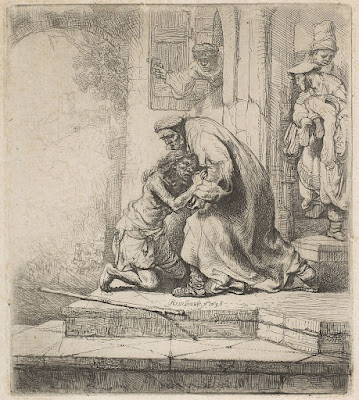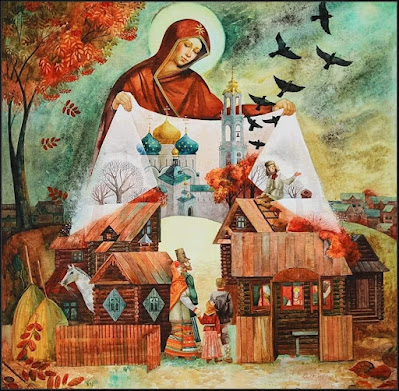Thanks to science and technology, we
know that the highest point on the planet earth is Mt. Everest at over 29,000
feet. We know that the lowest point on the
planet earth is the Mariana Trench, which extends almost seven miles beneath
the ocean. We have been told the world's
circumference is 24,901 and one-half miles and has 7.7 billion inhabitants. Science and technology can give us
the measure of many things, but they cannot answer the question, "Why is
there a Mt. Everest to measure? "Why is there a Mariana Trench to
fathom?" "How did the planet earth and its 7.7 billion current
inhabitants of the previous more than 100 billion inhabitants come to be?
Science and technology cannot answer the question why is the anything to
measure?"
As human beings, we feel a little
better about ourselves and more in control of things if we can ask questions
like why and how and get satisfying answers or lay the blame when things have
gone wrong. Our egos will not allow us to be satisfied until we have a solution
to all our questions, who, what, when, where, and why.
Today's Gospel reading opens with
some people telling Jesus that Pilate slaughtered some Galileans and then
mingled their blood with sacrifices. This is the same vacillating Pontius
Pilate who, against his own better judgment, handed Jesus over to be crucified.
There is no other mention of this incident in the bible, and the only account
we have at all comes from the historian Josephus. Josephus wrote of a minor
uprising of Jews after Pontius Pilate took the temple money and used it to
build an aqueduct in Jerusalem. Pilate suppressed the rebellion by having
disguised Roman soldiers mingle with the Jewish people. Upon a given signal,
the Roman soldiers took out their weapons and attacked the civilian population.
This was a good-sized crowd of people, and the vast majority of them made it
out without a scratch on them. But what about those that did not make it out
alive? Why this man was killed but not that one? Why this woman was killed but
not this one? Why this pain and suffering? The crowd asked, "Were the ones
killed greater sinners than those who survived"? People wanted to know why
this happened.
Jesus then tells another story of
suffering. This one of when a tower fell in Siloam and killed 18 people. Along
the southwest wall of ancient Jerusalem are the visible ruins of a collapsed
tower that was never completed. This is believed to be that tower, and the
people who were killed may have been the workmen involved in the building of
the tower. More questions; How could this have happened? Why did this happen?
Why did this happen now? Why?
The people came to Jesus for answers
about suffering and pain, and if you listen carefully, Jesus does not give any.
Jesus does go into a parable about a fig tree. He avoids the question by
changing the subject to a story about a barren fruit tree. We will come back to
the fig less fig tree a little later.
In the Gospel of John, chapter 9,
Jesus and his disciples come upon a man born blind. The disciples ask Jesus who
is responsible for this man's sufferings. The disciples assume the only reason
this man's sufferings were due to someone's sinfulness, his or his parents.
Again Jesus does give an accurate answer as to the nature of suffering. Jesus
does cure the man of his blindness right there on the spot, Jesus tells the
blind man to go and wash in the pool of Siloam, to be healed, and he stayed
away from any towers.
The book of Job tells of
a man who had a life many would envy; Job had his health, a loving wife and
children, and a prosperous farm with abundant livestock, and overnight he lost
everything but his wife. Job is then visited by his three best friends, and
they drown on and on about why this suffering has come upon him, once again
looking for answers but finding none. Towards the end of the book, Job gets to
speak to God himself. God speaks for a few chapters asking Job questions such
as "Where were you when I founded the earth?" and "Do you give
the horse his strength and does the eagle fly up and your command? But even God
does not answer why there is suffering. When we covered the Book of Job in
Seminary, my professor said this was the most unsatisfying part of the bible;
with lots of buildups but no proper conclusion, we are left with more questions
than answers.
Many people have offered reasons to
those suffering and experiencing pain; God is testing you. God is punishing
you. It would help if you suffered for the sake of others. That's just the way
things are. It's your turn to suffer. You are here to work off bad karma. There
is a curse upon your family. God never allows pain without a purpose. These
comments are beginning to sound like Job's helpful friends.
There is much we do not understand,
so let's look at what we know.
Suffering is universal; there is not
a person here or any person we have ever known or will meet that does not have
a story that would break your heart.
Suffering is like a pebble dropped
into still water, with small waves rippling out across the once still surface.
When suffering happens, it often starts with one or a few individuals and then
moves out to family, loved ones, friends, acquaintances, and even strangers.
How many people on this planet felt for the pain of those in Ukraine? And
asked why?
God did not create suffering, nor
does he enjoy seeing pain. The prophet Habakkuk says of the nature of God,
"Your eyes are too pure to approve evil" The God who has attributes
such as holiness, righteousness, love, goodness, and truth could not be the
originator of pain and suffering. We address God as our Father; what father
would enjoy watching his children suffer?
God is always with us, and God will
never abandon us. Genesis 15: "Know that I am with you, and will protect
you wherever you go," The Prophet Isaiah writes, "Fear not for I am
with you, be not dismayed, for I am your God" Psalm 138: "Though I
walk in the midst of dangers you guard my life when my enemies rage.” Our eyes
may not always be on God, but His eyes are always on us.
The only proper understanding that
we can come to is pain and suffering are a mystery, yes, we can use it for many
things, and much good has come from suffering, but pain and suffering are a
mystery. A mystery that can unite us to Christ, in His pain and suffering, for
He suffered far more significantly than any of us could imagine. Suffering
allows us to join Him in one of the greatest mysteries of all.
Back to the fig tree, this fig tree
is barren, but all the trees around it have been bearing fruit. Sometimes that
can happen to people; we go through a season of pain, go through a time of
suffering and cannot produce good fruit, and are not able to flourish.
In St. Paul's letter to the Romans,
he writes, "We know that all things work for the good for those who love
God."If anyone knew a thing or two about suffering, it would be Paul. We rarely
get to choose whether or not to suffer, but we get to decide how it affects us
and what we do with it.
This is the story of a woman who had
such a rough start to life that her name was misspelled on her birth
certificate and has wound up being called by that wrong name her whole life.
This woman was born to a single mother who cleaned houses to make ends barely
meet. As a young woman, she was sexually abused by relatives and family
friends; things got so bad she tried to run away. She wound up getting pregnant
but miscarried, and at one point was so desperate for something better she
almost married a young man she did not love and would have been the wife of an
undertaker. This young woman was Oprah Winfrey.
I used these two examples because
both of these people knew suffering but were able to take that pain and use it
to bear good fruit; they were able to do extraordinary things. But not everyone
is meant to walk across the big stage. Some people use their suffering as a
catalyst to change their lives, such as new careers, lifestyle changes, or
maybe coming to an abbey. For some people, their personal victory over pain and
suffering could be as small as just getting out of bed every day, and that
person might be sitting right next to you.
Until we see God face to face, we
will not know the why's of pain and suffering, they will remain a mystery, a
mystery that often we cannot avoid, but we can decide how it is going to affect
us and what we are going to do with it. Photograph by Brother Brian. Today's homily by Brother Stephen.




















